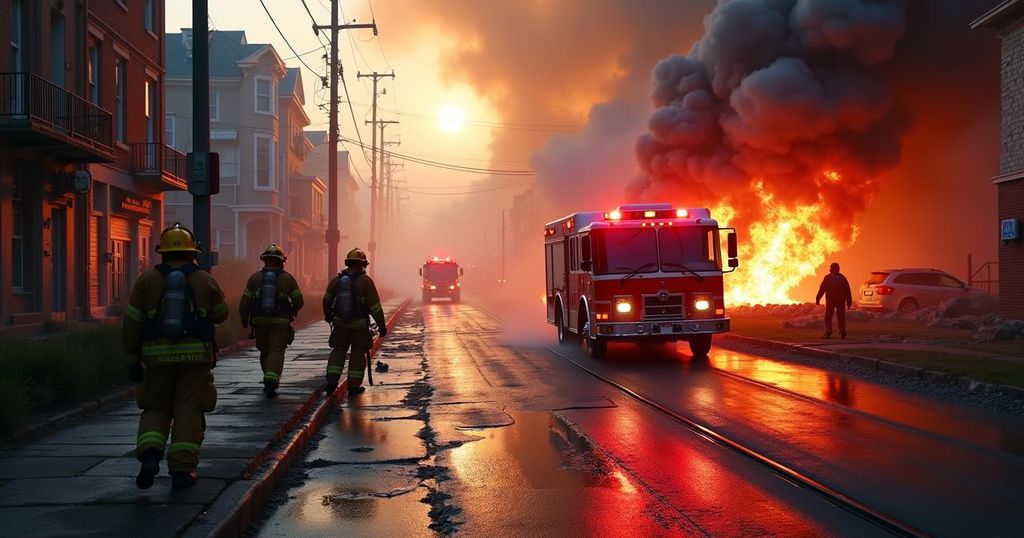Lebanese Emergency Responders Claim Israeli Strikes Compromise Their Safety and Operations
Lebanese firefighters and paramedics report being endangered by Israeli military strikes, which complicate their rescue operations as they face threats to withdraw from impact sites. The ongoing conflict has resulted in numerous casualties among emergency responders and widespread displacement of civilians in Lebanon.
Lebanese emergency responders, including firefighters and paramedics, have reported that Israeli military strikes are endangering their lives and hindering their rescue efforts. The Israeli Defense Forces (IDF) have asserted that their operations target the infrastructure of the militant group Hezbollah. However, the Lebanese civil defense department stated that these strikes have resulted in the deaths of five emergency workers in an aerial bombardment on their base in Derdghaiyah. The fatalities have exacerbated concerns among firefighters and paramedics who assert that they have either been fired upon or advised by the IDF to vacate areas before they can assist victims or extinguish fires caused by bombings. In the midst of ongoing intense confrontations between Israeli and Hezbollah forces, these firefighters frequently receive alerts from the IDF, instructing them to withdraw prior to planned strikes. South Beirut’s fire and rescue commander, Saad al Ahmar, recounted instances where the military’s warnings jeopardize their operations, leading to more casualties than necessary. He noted, “At certain moments we received several phone calls from the Israeli enemy warning us…” – emphasizing the psychological toll these threats place on rescue teams. This conflict has intensified since the initiation of Israel’s ground invasion last month, following ongoing rocket exchanges with Hezbollah, further instigated by the recent Gaza war. Over a million individuals in Lebanon have been displaced as a result of escalating hostilities. The humanitarian ramifications are dire, as emergency workers find it increasingly challenging to operate under the constant threat of aerial strikes. Moreover, the Lebanese Red Cross has expressed concern for the safety of their paramedics, highlighting a near miss from an airstrike that resulted in casualties among Lebanese Armed Forces personnel. The organization’s director, Kassem Shaalan, advocated for adherence to the Geneva Conventions, which obligate protection for non-combatants and health workers in conflict zones. In response to the situation, the IDF has accused certain paramedic groups of collaborating with Hezbollah, making the operational environment for volunteer responders exceedingly precarious. The IDF’s spokesperson has warned that any rescue vehicle misused for combat purposes will face military action, further complicating the protective measures intended for medical personnel.
The article discusses the perilous conditions faced by Lebanese firefighters and paramedics amidst the backdrop of violent clashes between the Israeli military and Hezbollah forces. As Israel conducts military operations targeting Hezbollah infrastructure, rescue teams report being obstructed and endangered while attempting to perform their humanitarian duties. This situation is exacerbated by claims from the IDF that some rescue organizations have been exploited by Hezbollah, leading to a tense atmosphere where emergency responders fear for their safety and ability to assist victims of the ongoing conflict.
In summary, the ongoing conflict between Israel and Hezbollah poses significant challenges to emergency response teams in Lebanon. The threats and military operations conducted by the IDF not only jeopardize the lives of firefighters and paramedics but also delay crucial rescue efforts, exacerbating the humanitarian crisis in the region. As the situation unfolds, the safety and operational efficacy of these responders remain critical concerns, underlined by the need for compliance with international humanitarian law to safeguard non-combatants and humanitarian workers.
Original Source: www.abc.net.au








Post Comment